Similar titles: Wicazo Sa Review
-
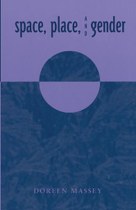 Space, Place, and Gender
Doreen Massey
1994 Fall
Space, Place, and Gender
Doreen Massey
1994 Fall
- A leading feminist geographer puts forth new ways of thinking about space and place.
-
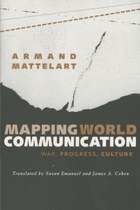 Mapping World Communication
War, Progress, Culture
Armand Mattelart
1994 Fall
Mapping World Communication
War, Progress, Culture
Armand Mattelart
1994 Fall
- A distinguished media theorist exposes the connection between militarism and the evolution of the media industry.
-
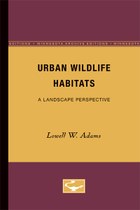 Urban Wildlife Habitats
A Landscape Perspective
Lowell W. Adams
1994 Spring
Urban Wildlife Habitats
A Landscape Perspective
Lowell W. Adams
1994 Spring
- In this first book-length study of the subject, Adams reviews the impact of urban and suburban growth on natural plant and animal communities and reveals how, with appropriate landscape planning and urban development, cities and towns can be made more accommodating for a wide diversity of species, including our own.
-
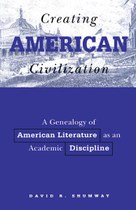 Creating American Civilization
A Genealogy of American Literature as an Academic Discipline
David R. Shumway
1994 Spring
Creating American Civilization
A Genealogy of American Literature as an Academic Discipline
David R. Shumway
1994 Spring
- “‘American literature’ seems by now so natural and inevitable an entity that we forget that it did not just grow organically out of American soil, much less spring full blown from the minds of a few geniuses. In this highly readable study, David Shumway recovers the forgotten social, historical, and institutional conditions that explain why the concepts both of ‘literature’ and of distinctive literary Americanness emerged together at a particular time and place and how their merger reshaped America's educational vision. Shumway has written a penetrating and provocative account of the making of American Civilization as an academic field.” --Gerald Graff, University of Chicago
-
 City and Spectacle in Medieval Europe
Barbara A. Hanawalt and Kathryn L. Reyerson, Editors
1994 Spring
City and Spectacle in Medieval Europe
Barbara A. Hanawalt and Kathryn L. Reyerson, Editors
1994 Spring
- Drawing examples from Spain, England, France, Italy, and the Netherlands, most of them in the fifteenth century, the contributors explore the uses of ceremony as statements of political power, as pleas for divine intercession, and as expressions of popular culture. Their essays show us spectacles meant to confirm events such as victories, the signing of a city charter, or the coronation of a king. In other circumstances, the spectacle acts as a battleground where a struggle for the control of the metaphors of power is played out between factions within cities or between cities and kings. Still other ceremonies called upon divine spiritual powers in the hope that their intervention might save the urban inhabitants. Contributors; Lorraine Attreed, Brigitte Bedos-Rezak, Elizabeth A. R. Brown, Lawrence McBride Bryant, Maureen Flynn, Barbara A. Hanawalt, Bram Kempers, Sheila Lindenbaum, Ben R. McRee, James Murray, David Nicholas, Gerard Nijsten, Nancy Freeman Regalado, Kathryn L. Reyerson, and Teofilo R. Ruiz.
-
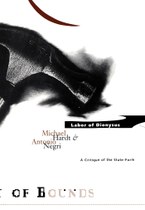 Labor of Dionysus
A Critique of the State-Form
Michael Hardt and Antonio Negri
1994 Spring
Labor of Dionysus
A Critique of the State-Form
Michael Hardt and Antonio Negri
1994 Spring
- “Labor is the living, form-giving fire,” Marx wrote. “It is the transitoriness of things, their temporality, as their transformation by living time.” How is it, then, that labor, with all its life-affirming potential, has become the means of capitalist discipline, exploitation, and domination in modern society? The authors expose and pursue this paradox through a systematic analysis of the role of labor in the processes of capitalist production and in the establishment of capitalist legal and social institutions. Critiquing liberal and socialist notions of labor and institutional reform from a radical democratic perspective, Hardt and Negri challenge the state-form itself.
-
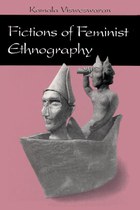 Fictions of Feminist Ethnography
Kamala Visweswaran
1994 Spring
Fictions of Feminist Ethnography
Kamala Visweswaran
1994 Spring
- Although feminist ethnography is an emerging genre, the question of what the term means remains open. Recent texts which fall under this rubric rely on unexamined notions of “sisterhood” and the recovery of “lost” voices. In these essays about her work with women in Southern India, Kamala Visweswaran addresses such troubled issues. Blurring distinctions between ethnographic and literary genres, these essays employ the narrative strategies of history, fiction, autobiography and biography, deconstruction, and post-colonial discourse to reveal the fictions of ethnography and the ethnography in fiction.
-
 Freshwater Marshes
Ecology and Wildlife Management
Milton W. Weller
1994 Spring
Freshwater Marshes
Ecology and Wildlife Management
Milton W. Weller
1994 Spring
- In this updated third edition, Weller describes the components of the freshwater marsh-its annual and seasonal dynamics as affected by rainfall cycles and the plant and animal population's response to such changes. Weller discusses how such wetland areas are managed for wildlife populations and diversity, and how such processes can be used in wetland conservation and restoration. He considers the impact society has on wetlands and offers conservation goals for freshwater wetland complexes. Weller broadens the third edition to include an analysis of how prairie wetlands compare in water dynamics with swamps, tidal marshes, and other wetlands. He also expands the discussion of wetland classification, evaluation, mitigation, and restoration, and introduces a new glossary of current wetland terminology.
-
 Reading Proust
In Search of Wolf-Fish
Maria Paganini
1994 Spring
Reading Proust
In Search of Wolf-Fish
Maria Paganini
1994 Spring
- Reading Proust focuses on the specificity of Proustian writing, revealing the patterns of thought and play of words peculiar to Proust's language, and showing how these metamorphose throughout La Recherche du temps perdu. Her work offers a new model for reading fictional prose, one that replaces the critical "why?" with the more practical and productive "how?"
-
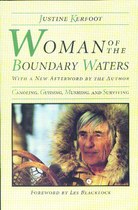 Woman of the Boundary Waters
Canoeing, Guiding, Mushing, and Surviving
Justine Kerfoot
1994 Spring
Woman of the Boundary Waters
Canoeing, Guiding, Mushing, and Surviving
Justine Kerfoot
1994 Spring
- The Boundary Waters region of Minnesota and Ontario is a vast wilderness of quiet beauty, visited and loved by many, but home to only a rugged few. Justine Kerfoot arrived there in 1928 and has lived there ever since. As she relates her lessons from the Canadian Indians across the lake-how to paddle a canoe, hunt moose, drive a dog team, and stay warm at minus 40 degrees-Kerfoot gives us a rich sense of the world of the Indians and fur trappers. Her lyrical descriptions of wildlife and seasonal environments express the deep reverence for nature that has become her way of life.
-
 Museum Culture
Histories, Discourses, Spectacles
Daniel J. Sherman and Irit Rogoff, Editors
1994 Spring
Museum Culture
Histories, Discourses, Spectacles
Daniel J. Sherman and Irit Rogoff, Editors
1994 Spring
- Written from a broad range of perspectives in history, art history and criticism, critical theory, and sociology, the essays in this volume go beyond previous institutional analyses to consider museums as the intricate amalgam of architecture, history, practices and strategies of display, pedagogical and other programs, functioning under the aegis of various governing ideologies. Contributors: Ariella Azoulay, Frederick N. Bohrer, Chantal Georgel, Walter Grasskamp, Boris Groys, Anne Higonnet, Detlef Hoffman, Seth Koven, Dominique Poulot, Irit Rogoff, Daniel J. Sherman, Brian Wallis, and Vera L. Zolberg.
-
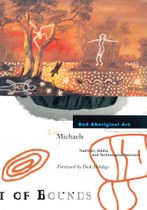 Bad Aboriginal Art
Tradition, Media, and Technological Horizons
Eric Michaels
1993 Fall
Bad Aboriginal Art
Tradition, Media, and Technological Horizons
Eric Michaels
1993 Fall
- This is the account of the author‘s period of residence and work with the Walpiri Aborigines of western Central Australia, where he studied the impact of television on these remote communities. Sharp, exact, and unrelentingly honest, this volume records with an extraordinary combination of distance and immersion the intervention of technology into a remote Aboriginal community and that community’s forays into broadcasting.
-
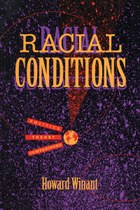 Racial Conditions
Politics, Theory, Comparisons
Howard Winant
1994 Spring
Racial Conditions
Politics, Theory, Comparisons
Howard Winant
1994 Spring
- More than a quarter-century after the passage of civil rights legislation in the United States and decades since the last European colonies attained their independence, race continues to play a central role in cultural, political, and economic life, both in the United States and around the globe. Howard Winant argues that race cannot be understood as a “social problem” or as a “survival” of earlier, more benighted ages. Indeed, from the rise of Europe to the present, race has been a social condition, a permanent though flexible feature of human society and identity. Among the topics discussed are the relationship between race and class, as well as the racial dimensions of gender, diaspora, colonialism, and fascism. Other key topics include the changing nature of racial identity in the post-civil rights era, the 1992 Los Angeles riot, and politics of race in Brazil.
-
 Passionate Fictions
Gender, Narrative, and Violence in Clarice Lispector
Marta Peixoto
1994 Spring
Passionate Fictions
Gender, Narrative, and Violence in Clarice Lispector
Marta Peixoto
1994 Spring
-
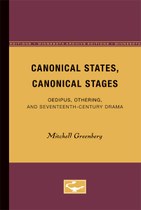 Canonical States, Canonical Stages
Oedipus, Othering, and Seventeenth-Century Drama
Mitchell Greenberg
1994 Spring
Canonical States, Canonical Stages
Oedipus, Othering, and Seventeenth-Century Drama
Mitchell Greenberg
1994 Spring
- "Greenberg offers a powerful interpretation of the classical stage in its relationship to the emergence of absolutism in Europe....The originality and strength of the book reside in its fascinating integration of texts dealing with political theory, psychoanalysis, history, and literature....This book is one of the most important contributions to date on the study of the European classical stage." --Marie-Hélène Huet, University of Virginia